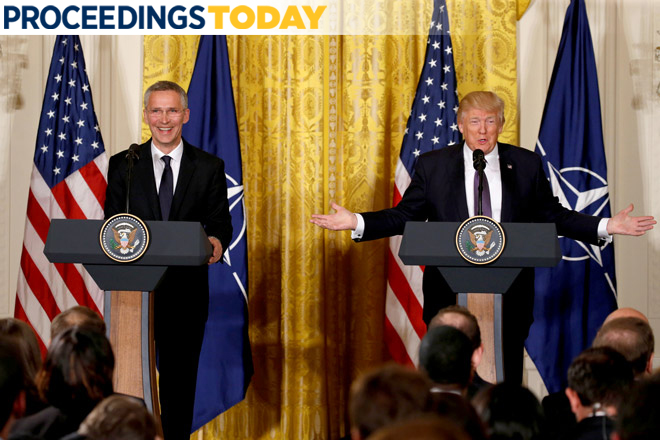
Then-President-elect Donald Trump startled U.S. alliance partners in Europe when he described NATO as “obsolete.” He really unnerved them by suggesting future U.S. commitments to defend members of that alliance might be conditional, depending on whether they had met their obligations to adequately fund their own defenses. Nonetheless, several senior U.S. policymakers traveled to Europe this February to reassure NATO allies that the United States would stand by its commitments. Secretary of Defense Jim Mattis was reassuring. At the annual Munich Security Conference, he noted, “President Trump came into office and has thrown now his full support to NATO.” But he also repeated a concern about the shared obligations of NATO members, observing bluntly, “It is a fair demand that all who benefit from the best alliance in the world carry their proportionate share of the necessary costs to defend our freedoms.”
European contributions to NATO’s overall readiness have been a concern for the past few years. NATO’s anemic military budgets after 1991 were understandable given the reduced threat to European security. Then the recession of 2008 came, and NATO defense spending declined sharply, although this has been masked by the addition of new members, including Poland, Hungary, Bulgaria, Romania, and the Baltic States. Still, impelled by the financial crisis, security spending in Europe dropped 14 percent, 2007-2014.
Thanks to Russia’s assertive behavior, Europe’s disarmament has stopped and a modest funding increase has begun, consistent with the agreements announced at the NATO Summit in Wales in 2014. That announcement articulated a general commitment to move toward a common goal of investing 2 percent of GDP by 2024. Despite its flaws as a crude input, the 2 percent GDP metric is a transparent goal and a reflection of commitment. As such it is likely to remain the standard in the debate over shared obligations in NATO.
Progress toward that aim is slow. NATO claims a 3.8 percent increase in NATO European defense expenditures, which equates to a significant $10 billion (U.S.) boost in spending. This is the first aggregate increase since 2008’s financial crisis; with notable increases from both Germany and Italy. The major point is that the defense decline has been turned around but more progress is needed, just as NATO Secretary General Jens Stoltenberg inveighed at the February Munich Security Conference. Yet some German politicians believe Russia is a temporary problem and that significant increases in security spending are not warranted. Domestic politics has allowed Germany’s defense spending to flatten at 1.2 percent of GDP. Given that nation’s large economy that level should still produce substantial real combat capability. However, the German military is considered overstretched and underfunded. This is what pushed Secretary Mattis to tell his European audience at the conference: “Americans cannot care more for your children's future security than you do.”
In a speech at Brussels, Secretary Mattis warned: “If your nations do not want to see America moderate its commitment to this alliance, each of your capitals needs to show support for our common defense.” A formal partnership like NATO should have agreement about pooled resources and risk. No one should be trying to shortchange other partners.
The Next Summit
The first steps toward the fair and proper funding of NATO were taken at Wales and need to be pursued with resolute political leadership and a common understanding of the dangers the United States seeks to prevent. The President recently hosted the Secretary General in Washington and again expressed his support for NATO. He should do so again this spring at the upcoming mini-summit.
NATO remains the world’s great alliance, and it should remain capable in the face of old threats that have reemerged in the 21st century. Maintaining the territorial integrity of Europe’s borders is the greatest challenge the alliance has faced since the Cold War. That should be NATO’s focus for now and remain the primary agenda item for the upcoming summit scheduled for later this month.
The Trump administration should continue to make the U.S. Article V commitment to allies unambiguous, but it also should make additive commitments of funding more conditional on NATO sustaining its progress. The United States should be patient with its allies but equally persistent about measuring real warfighting capability. This would put begin to put teeth into NATO as a deterrent force and ensure it contributes to what Dr. Stan Sloan rightfully calls the “Defense of the West” (Oxford University Press, 2016). At the end of the day, NATO underwrites a free and prosperous Europe able to secure its borders against aggression. This is not just a priority for European friends, but a vital interest of the United States.
Dr. Hoffman is a Distinguished Research Fellow at the Institute for National Security Studies, National Defense University.



